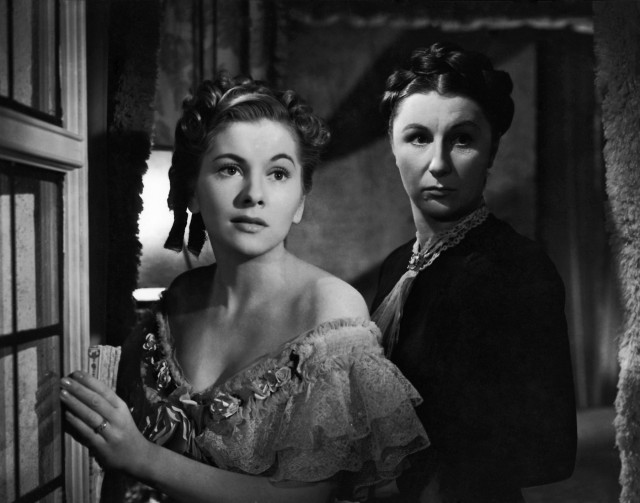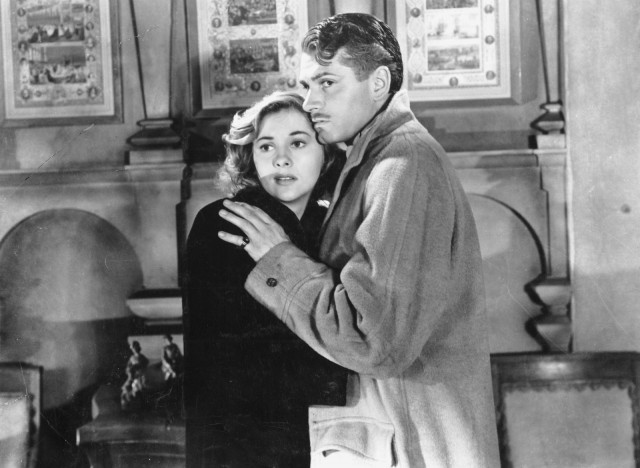CABARET CINEMA: REBECCA (Alfred Hitchcock, 1940)
Rubin Museum of Art
150 West 17th St. at Seventh Ave.
Friday, March 18, $10, 9:30
212-620-5000
rubinmuseum.org
 “Last night I dreamt I went to Manderley again.” The opening line of Rebecca, Alfred Hitchcock’s first Hollywood picture, instantly sends chills down the spine of anyone who has seen the film or read the book on which it is based, Daphne du Maurier’s 1938 novel of the same name. The line is spoken in voice-over by the second Mrs. de Winter (Joan Fontaine), so haunted by the first Mrs. de Winter, the recently deceased Rebecca, that she never even gets a first name, depriving her of her own identity. While serving as a paid companion to snooty wealthy matron Edythe Van Hopper (Florence Bates) on a trip to Monte Carlo, the orphaned young woman meets the dapper but dark Maxim de Winter (Laurence Olivier), an elegant widower who takes a liking to her. Following a whirlwind courtship, they are married, and Maxim takes his mousey bride to his castlelike Cornwall estate, Manderley, where she is constantly compared to and overshadowed by the ghost of Rebecca, idolized as the perfect woman by the large staff, in particular the grim housekeeper, Mrs. Danvers (Judith Anderson), who relentlessly tortures the second Mrs. de Winter. “You wouldn’t think she’d been gone so long, would you?” Mrs. Danvers tells her. “Sometimes, when I walk along the corridor, I fancy I hear her just behind me. That quick light step, I couldn’t mistake it anywhere. It’s not only in this room, it’s in all the rooms in the house. I can almost hear it now.” But just as the second Mrs. de Winter finally tries to establish herself — “I am Mrs. de Winter now” she declares to Mrs. Danvers — Maxim shares a shocking truth about the first Mrs. de Winter that turns her world inside out.
“Last night I dreamt I went to Manderley again.” The opening line of Rebecca, Alfred Hitchcock’s first Hollywood picture, instantly sends chills down the spine of anyone who has seen the film or read the book on which it is based, Daphne du Maurier’s 1938 novel of the same name. The line is spoken in voice-over by the second Mrs. de Winter (Joan Fontaine), so haunted by the first Mrs. de Winter, the recently deceased Rebecca, that she never even gets a first name, depriving her of her own identity. While serving as a paid companion to snooty wealthy matron Edythe Van Hopper (Florence Bates) on a trip to Monte Carlo, the orphaned young woman meets the dapper but dark Maxim de Winter (Laurence Olivier), an elegant widower who takes a liking to her. Following a whirlwind courtship, they are married, and Maxim takes his mousey bride to his castlelike Cornwall estate, Manderley, where she is constantly compared to and overshadowed by the ghost of Rebecca, idolized as the perfect woman by the large staff, in particular the grim housekeeper, Mrs. Danvers (Judith Anderson), who relentlessly tortures the second Mrs. de Winter. “You wouldn’t think she’d been gone so long, would you?” Mrs. Danvers tells her. “Sometimes, when I walk along the corridor, I fancy I hear her just behind me. That quick light step, I couldn’t mistake it anywhere. It’s not only in this room, it’s in all the rooms in the house. I can almost hear it now.” But just as the second Mrs. de Winter finally tries to establish herself — “I am Mrs. de Winter now” she declares to Mrs. Danvers — Maxim shares a shocking truth about the first Mrs. de Winter that turns her world inside out.

The second Mrs. de Winter (Joan Fontaine) is mercilessly tortured by Manderley housekeeper Mrs. Danvers (Judith Anderson)
Nominated for eleven Oscars and winner of two (for Best Picture and Best Black and White Cinematography, by George Barnes), Rebecca is a gripping Gothic thriller about fear, obsession, love, identity, and memory. Although the film is filled with Hitchcockian touches, producer David O. Selznick had a large hand in the final version, reediting and supervising several reshoots to keep closer to du Maurier’s novel. From the script, written by Robert E. Sherwood and Joan Harrison based on Philip MacDonald and Michael Hogan’s adaptation, to Franz Waxman’s dramatic score, Joseph B. Platt and Howard Bristol’s interiors, and the uncredited costumes, Rebecca is a masterpiece of precision, with fascinating undertones of incest (Olivier is more like a father to Fontaine than a lover; George Sanders plays a cad who is supposedly a cousin of Rebecca’s) and lesbianism (Mrs. Danvers’s devotion to Rebecca appears to be more than just that of a loyal employee). It’s also hard not to watch it today without thinking of such later 1940s films as Gaslight and Citizen Kane, especially that ending. An oft-delayed, financially troubled Broadway musical version has been in the works for several years, promising “the Manderley Experience,” but it’s going to be tough to top du Maurier’s book and Hitchcock’s film when it comes to telling this multilayered story of mystery and romance. Rebecca, which also stars Nigel Bruce as Maxim’s brother, Giles, Gladys Cooper as Giles’s wife, Beatrice, Reginald Denny as the manager of Manderley, and Leo G. Carroll as Rebecca’s doctor, is screening March 18 at 9:30 in the Rubin Museum Cabaret Cinema series “Emotions / Emoticons” and will be introduced by Caitlin Leffel and Jacob Lehman, authors of The Best Things to Do in New York: 1001 Ideas. The nine-week festival is being held in conjunction with the Brainwave series “Emotion,” with each film focused on a different state of mind. Rebecca is happiness (happiness?!?); future screenings include Alain Resnais’s Hiroshima, Mon Amour (anger), Jean-Luc Godard’s Contempt (love), Charles Chaplin’s The Kid (sadness), and David Lynch’s Eraserhead (disgust).
